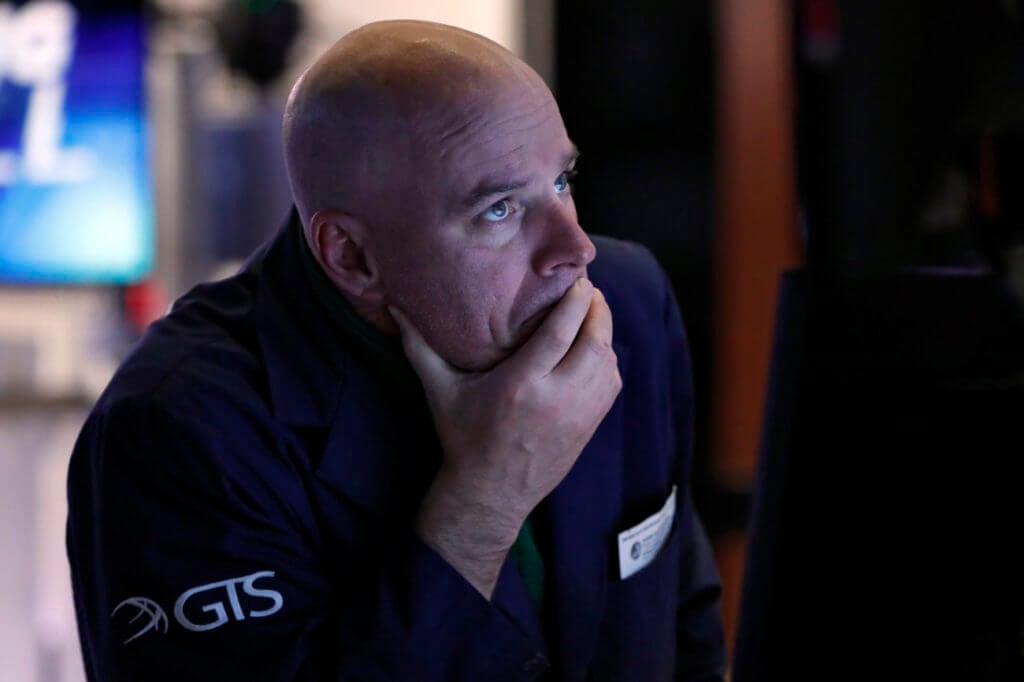S&P 500 ‘Zombie’ Apocalypse Looms for the Stock Market

S&P 500 companies barely scraping by on their debt payments led the stock market higher last month. That’s a recipe for disaster. | Image: AP Photo/Richard Drew
- The S&P 500 just marked its best month since 1987.
- But “zombie” companies that barely earn enough to service interest on corporate debt outperformed the index by more than ever before in April.
- Even the usually bullish Jim Cramer says, “The market got ahead of itself,” and advises to wait “for the market to go lower to do any buying.”
April was the S&P 500’s best month since 1987. The large-cap index opened the month at the 2,498.08 level and closed Thursday at 2,912.43 for a whopping 16.5% rally.
But ballooning valuations may not be justified by the underlying finances of many S&P 500 companies. While earnings crashed in the first quarter and will likely be worse for quarter two, corporate debt bubble remains a ticking time bomb for many companies.
The rise of “zombie” companies, just barely able to service the interest on their debt without paying down the principal, poses a severe risk to the stock market rally.
Charles Schwab Strategist Calls Out Zombie Companies

Liz Ann Sonders, chief investment strategist for Charles Schwab & Co., ridiculed the stock market rally with one incredibly revealing fact. At one point last month, shares of zombie companies outperformed the S&P 500 Index by the largest margin in history.
The Arbor Data Science metric Sonders quoted defines zombie companies as those with a three-year average EBIT-to-interest coverage ratio of less than one. The metric confines its data set to companies with a market cap greater than $300 million.
In other words, companies that are not earning enough before interest and taxes to service interest payments on their corporate debt for one year led the stock market’s surge in April. These are companies at high risk of financial stress.
Zombie companies are usually heavily indebted , cannot pay down the principal on their debt, depend on low interest rates to meet loan interest payments, and are unable to restructure to become more profitable because their debt is dragging them down.
Economists agree that a higher emergence of zombie companies in the 2008 recession hampered the recovery . Their record outperformance of the S&P 500 Index last month is evidence of a lot of frothy in the share price rally.
Jim Cramer: Stock Market Got Ahead of Itself
Many of the stocks that crashed hardest in February and March were the ones to post the biggest gains last month. Investors bet these companies will survive the downturn and scooped up shares at value. But many of them are barely scraping by, and we may not be out of the woods yet.
And Wall Street cooled May 1, with a 2.8% capitulation in the S&P 500, and 2.6% for the Dow Jones. It might be about more than renewed U.S. China trade war fears.
Even the exuberant, ever-bullish Jim Cramer cautioned Friday :
The market got ahead of itself. So now we’re having a curb-your-enthusiasm moment, so please be careful out there.
Then he took his warning further and advised viewers to wait to acquire equities:
I really do believe it’s worth waiting for the market to go lower to do any buying unless we got some incredible vaccine news over the weekend, and I don’t think we’re going to get that.
This is the same Jim Cramer who flogged the trillion-dollar NASDAQ rally from last summer right up until the crash this year. Then after the stock market crashed, he suddenly went Warren Buffett and told viewers to be greedy when others are fearful .
The old Buffett adage, from a 1986 letter to Berkshire Hathaway shareholders is :
We simply attempt to be fearful when others are greedy and to be greedy only when others are fearful.
But given the “Mad Money” host’s penchant for perma-bullish commentary, it may also be sound advice to be completely terrified when Jim Cramer is fearful.
Disclaimer: The opinions expressed in this article do not necessarily reflect the views of CCN.com. The above should not be considered investment advice from CCN.com. The author holds no investment position in the S&P 500.